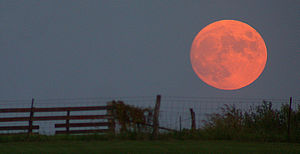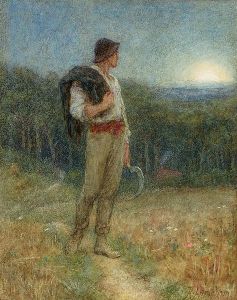September Midnight
Lyric night of the lingering Indian Summer,
Shadowy fields that are scentless but full of singing,
Never a bird, but the passionless chant of insects,
Ceaseless, insistent.
The grasshopper’s horn, and far-off, high in the maples,
The wheel of a locust leisurely grinding the silence
Under a moon waning and worn, broken,
Tired with summer.
Let me remember you, voices of little insects,
Weeds in the moonlight, fields that are tangled with asters,
Let me remember, soon will the winter be on us,
Snow-hushed and heavy.
Over my soul murmur your mute benediction,
While I gaze, O fields that rest after harvest,
As those who part look long in the eyes they lean to,
Lest they forget them.
Sara Teasdale
Summer is all but officially over for the year. College is in full swing, schools are back in session, football is back on television, and I have made the switch of wardrobe. Away go the sleeveless and the shorts, and in with the jeans and the sweaters.
On this night of the big, brilliant harvest moon, I am thinking about Sara Teasdale’s poem.
There are people who like good-byes and people who avoid them. Maybe because I was a military child and so profoundly used to good-byes and their significance, I am the type who needs those moments to bid farewell, not necessarily to people, but definitely to places and times.
I like to take that extra moment to go into an empty house before I move, going from room to room and breathing it into my memory before leaving.
Why not take a picture, you ask? Good question. I don’t know the answer. I have pictures of my old bedrooms and houses, but I don’t look at them.
I vividly remember sitting crossed- legged in my small bedroom closet as a seventh grader the day we left our house in Maryland to move to New York. I just wanted to remember it.
Why did I care about the closet? I didn’t sit in there before. I had no special attachment to it; nonetheless, there I sat for while trying to sear into my memory the slats of the folding door.
Maybe it is because leaving a place or a time is much like leaving yourself behind.
Life is constantly changing, and for a young person, that’s very unnerving. Heck, it is unnerving to think of as an adult.
Change is unavoidable, but it is even more difficult when you have very limited control over your life. That part of childhood is definitely not one that I would ever want to return to.
“September Midnight” is about the fast approaching change of seasons. In her poem, summer is over; there are no more birds chirping, the growing season is over, and all that remains are the insects’ passionless chirps.
There is no scent to the fields and the moon is worn, broken, and tired.
So, really, what is she going to miss exactly?
These aren’t exactly beautiful images that she creates with diction such as weeds, worn, broken, tired, passionless, scentless, and shadowy.
She is afraid of the change more than the actual loss of the season, which reminds me of that little girl who didn’t want to leave that bedroom closet many years ago and move. It wasn’t a great place to be, but it was better than the change.
So we pause; we try to drink in the surroundings to taste them again when we want to. I don’t think there is anything wrong with that, either. That way, when the world gets too heavy, we can bring to our mind’s eye the images of what we know so well and find some comfort, even if that is just fallow fields and insect chirps.
It only becomes a problem when you spend all of your time pining away for the past and thereby missing out on the new phase of life.
When I left my teaching job, I spent many moments looking at my empty classroom. Being a teacher was the way I defined myself, and leaving that behind to start another phase in life was a bigger challenge than leaving any house. When my girls are in the middle of big fits, it is nice to be able to bring to mind the peaceful classroom I once had and imagine what it would be like to return one day. . . but not too soon.
We might want to make the symbolic leap that she is reflecting not on a literal change of seasons, but on a figurative change in the seasons of life. Perhaps this is commentary on the hesitation we feel when entering the autumn of our lives.
Because we are afraid of death, we focus on the dark, heavy, and cold parts of growing older, but with that attitude, we will easily miss out on all the beauty that is found in the winter, both literally and figuratively.
Happy autumn, and I hope the change of seasons finds you well.



